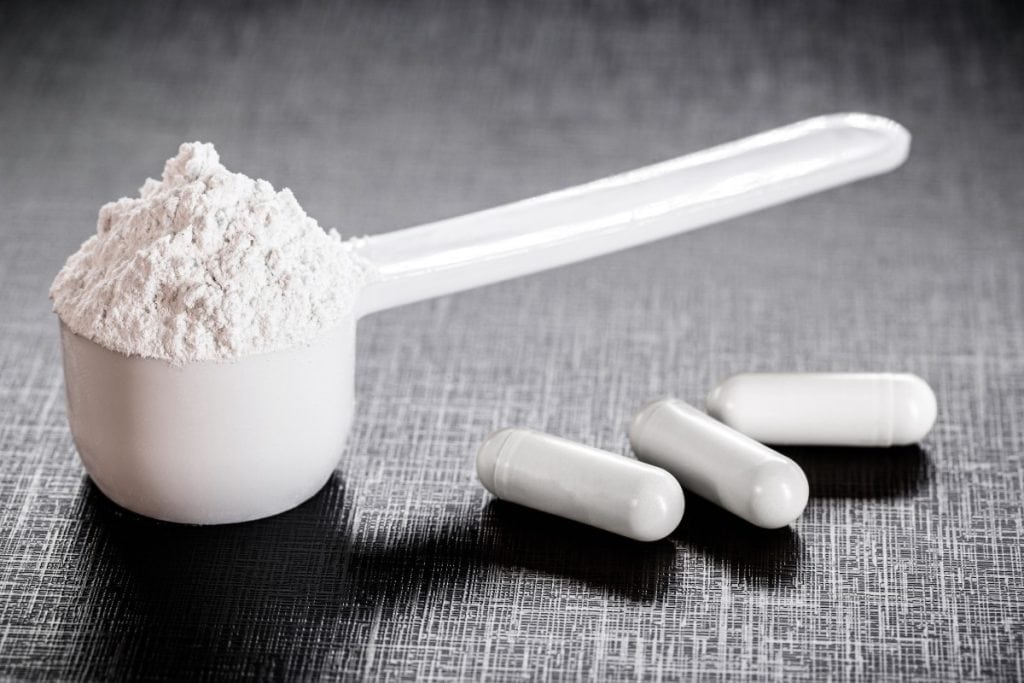Deciding the perfect time to take creatine puzzles many athletes. Creatine boosts muscle and brain energy. Our guide will show you when to take it for the best results. Keep reading, and let’s find out together.
Key Takeaways
- Creatine boosts muscle and brain energy, making it popular among athletes and fitness enthusiasts who want to improve workout performance and increase muscle mass.
- The best times for taking creatine are 30 minutes before a workout to enhance exercise performance and immediately after training sessions to aid recovery and muscle growth. On rest days, continue taking creatine to keep muscle levels stocked.
- Mixing creatine with carbohydrates may improve its absorption by the body. Daily consistency in taking creatine is crucial for maintaining its benefits, such as more energy during workouts and faster muscle growth.
- Anyone considering adding creatine to their regime should consult a healthcare professional first, especially individuals with pre-existing kidney conditions or those under 18 years old.
- Choosing the right form of supplement matters; ‘creatine monohydrate’ is widely recommended due to its proven safety and effectiveness.
Understanding Creatine

Moving from our introduction to a deeper dive, creatine emerges as a pivotal supplement in the realm of sports nutrition and resistance training. This natural substance plays a crucial role in energy production during high-intensity activities such as weightlifting or sprinting.
Found naturally in muscle cells, it helps your muscles produce energy during heavy lifting or high-intensity exercise.
Taking creatine supplements increases the phosphocreatine stores in your muscles. These extra stores can then be used to produce more ATP (adenosine triphosphate), which is often called the body’s energy currency.
For anyone engaging in resistance exercise training aiming for improved workout performance or increased muscle mass, understanding this mechanism is key. The process supports short bursts of strength and speed, making creatine popular among bodybuilders, athletes, and fitness enthusiasts looking for an edge in their training sessions.
Supplementation with 5–20 g/day of creatine for more than five days has shown to saturate muscles with this nutrient, enhancing strength and hypertrophy.
Benefits of Taking Creatine
Taking creatine boosts your workout performance by enhancing your strength and endurance. It also supports muscle growth and helps maintain energy levels during intense exercise.
Improved Workout Performance
Creatine supplementation boosts your gym performance significantly. It helps muscles produce more energy during high-intensity training or heavy lifting. This means you can perform extra sets and reps, pushing your boundaries further than before.
With creatine, sprinters run faster, boxers punch harder, and weightlifters lift heavier loads. Such improvements are key to achieving better results from each workout session.
This compound also speeds up muscle recovery between sessions. After a tough workout, taking creatine aids in quick healing of muscle tissues. It refills muscle energy stores faster and increases the amount of water in your muscles, making them appear bigger and feel stronger.
This rapid recovery allows for less downtime between workouts, enabling more frequent high-intensity training days without the risk of overtraining or injury.
Enhanced Muscle Growth
Muscle growth sees a significant boost with creatine supplementation. This happens because it replenishes muscle stores, essential for repairing and building bigger muscles after intense exercise.
Users experience an upsurge in fat-free mass and skeletal muscle size, making it a favourite among bodybuilders and athletes focused on strength training.
Creatine turns your workouts into the fuel for muscle magnification.
With this increase in muscular size, users often notice improvements in their performance during repetitive high-intensity activities like weight lifting and sprinting. Creatine’s role in the phosphagen system helps supply quick energy for these types of exercises.
Heading into discussions about increased energy levels will shed light on how creatine powers through tough workouts by optimising the body’s ability to produce energy rapidly.
Increased Energy Levels
Taking creatine boosts your muscles and brain, giving you more energy for workouts and daily activities. This happens because creatine helps increase the production of adenosine triphosphate (ATP), a key fuel source for muscle contraction during high-intensity exercise.
When you have more ATP, your body can perform better and last longer in both aerobic exercises like running and anaerobic activities such as lifting free weights.
By adding creatine to your diet, either with dietary supplements or through foods rich in this compound, you enhance the phosphocreatine system in your skeletal muscles. This upregulation allows for quicker regeneration of ATP between sets of exercises or sprints, reducing muscle fatigue and enabling you to maintain high levels of performance throughout your workout session.
Pairing creatine with carbs, such as fruit or juice, may also improve its absorption by the body, ensuring that these benefits are maximised.
Optimal Times for Creatine Intake
Finding the best time to take creatine improves muscle building and energy during workouts. Keep reading to make the most of your supplement routine.
Before a Workout
Taking creatine 30 minutes before your training session can significantly boost your exercise performance. This timing allows the compound to fully enter your bloodstream, preparing your muscles for enhanced energy production during high-intensity activities like sprints and heavy lifting.
By doing this, it supports not just immediate power but also helps in maintaining stamina throughout the workout, essential for max effort sports and combat training.

Optimal intake of creatine pre-workout upregulates energy availability for improved physical exertion.
Incorporating creatine into your pre-exercise routine also sets the stage for faster recovery post-training by reducing muscle damage during intense sessions. Athletes and fitness enthusiasts engaged in constant movement or running sports benefit greatly from this supplementation strategy as it aids in sustaining prolonged muscular contractions without fatigue.
Every dose taken before a workout contributes to building lean muscle mass and achieving progressive overload goals more effectively.
After a Workout
Shifting focus from preparation to recovery, consuming creatine post-exercise offers significant advantages. This timing aids muscular healing and replenishes muscle stores effectively.
It also boosts glycogen storage, cuts down on soreness, and increases water content in muscle cells. These benefits are crucial for athletes looking to enhance their recovery process after strenuous activities.
To maximise muscle retention, it’s best to combine creatine with carbohydrate-rich foods or proteins immediately following intense training sessions. This approach helps saturate muscles with creatine more efficiently, leading to better anaerobic threshold, greater work capacity, and improved performance in high-effort activities like lifting heavy weights or sprinting.
On Rest Days
Taking creatine on rest days keeps your muscle levels fully stocked, preparing you for your next session. Continuity is key to maintaining the benefits of this supplement. Without skipping a day, your body maintains high creatine concentrations, ensuring that you’re always ready to tackle workouts with full intensity.
Even on days without exercise, consuming creatine supports muscle recovery and prepares your body for future physical challenges. Think of it as laying the groundwork for success in upcoming training sessions.
This approach maximises the supplement’s effectiveness by keeping your muscles primed and ready at all times.
Considerations for Creatine Supplementation
Deciding to add creatine to your diet needs careful thought. It’s crucial to check daily usage and understand who should or shouldn’t opt for it, ensuring safety and effectiveness.
Choosing the right supplement, like Kaged Creatine HCl or creatine monohydrate, involves researching the best options that fit your health goals and workout regimen. Always consult a registered dietitian before starting any new supplement to avoid potential risks related to kidney function or interactions with other medications you might be taking.
Daily Usage
Taking creatine every day helps build up creatine stores in your muscles. This is key for getting the full benefits of this supplement, like more energy during workouts and faster muscle growth.
You don’t need to worry too much about the exact time you take it, as studies show it’s the regular intake that matters most. Make sure you stick to a daily routine that works for you.
Pick a specific time each day to take your creatine dose. It can be with breakfast, before or after your exercise session, or right before bed. The important part is consistency. This approach makes sure your muscles are always ready to perform their best, whether you’re lifting weights or running long distances.
Keep track of how much creatine you use daily to maintain a steady supply in your body system for optimal results.
Who Should and Shouldn’t Take Creatine
Transitioning from understanding the daily usage of creatine, it’s essential to identify who precisely stands to benefit from this supplement and who should steer clear. Athletes engaged in high-intensity activities like max effort sports, sprints, and combat disciplines find great value in creatine.
It boosts their performance, enhances muscle development, and improves energy sustainability during intense sessions. This group often includes individuals devoted to bodybuilding and those performing compound exercises that demand explosive strength.
However, creatine might not be suitable for everyone. Those with kidney disease should avoid it due to potential risks associated with impaired renal function or a reduced glomerular filtration rate.
Similarly, people living with conditions that affect the kidneys or liver must consult healthcare professionals before considering supplementation. Post-menopausal women and individuals on certain medications like NSAIDs or those managing high blood pressure also need to approach creatine use cautiously to prevent adverse health outcomes.
How to Choose a Creatine Supplement
Choosing the right creatine supplement involves looking for key indicators of quality and safety. First, opt for creatine monohydrate, widely recommended due to its effectiveness. It is crucial to check the product for NSF certification or third-party testing marks on its packaging.
These labels show that the product meets strict health standards.
Next, consider products which have undergone rigorous scrutiny beyond just their label claims. Such supplements are more likely to deliver the promised benefits without causing harm.
Conclusion
Finding the perfect moment to take creatine enhances your gym results. Studies show timing isn’t everything, yet pairing it with carbs might boost absorption. Whether before or after exercise, consistency matters most.
Keep side effects in mind and consult a healthcare professional for tailored advice, especially if under specific medical conditions. With smart use, creatine becomes a powerful ally in reaching fitness goals.
FAQs About Creatine Intake
1. What exactly is creatine?
Creatine is a naturally occurring substance that helps muscles produce energy during heavy lifting or high-intensity exercise, enhancing physical performance and muscular endurance.
2. When should I take creatine for the best results?
Taking creatine as a pre-workout supplement can increase your muscle stores of phosphocreatine, giving you more energy for high-intensity, short-duration exercises like sprinting or lifting weights.
3. Can taking creatine improve my health in other ways?
Yes, studies suggest that besides boosting athletic performance, creatine can enhance brain function, aid in bone loss prevention, and improve glucose metabolism which might help with diabetes management.
4. Are there any risks associated with taking creatine?
For healthy individuals, using FDA-approved doses of creatine as directed is generally safe but always consult a healthcare provider to ensure it fits your health needs and fitness goals.
5. How does creatine work within the body?
Creatine works by increasing your muscles’ phosphocreatinine stores allowing for quicker regeneration of adenosine triphosphate (ATP), which muscles use for energy during exercise.
6. Is there an ideal dose of Creatineto take?
While dosages can vary based on individual needs and fitness goals, starting with 20 grams per day divided into four servings for five days followed by 3-5 grams daily to maintain levels has shown effectiveness in research studies.